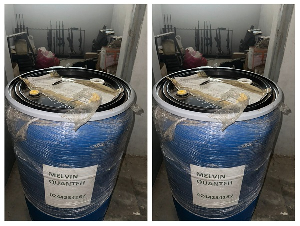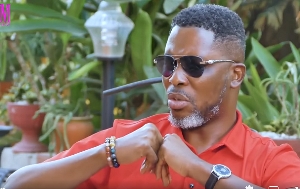Dr Adomako Kissi writes: 2021 budget focuses on improving opportunity and quality of life of every Ghanaian
 Dr Adomako Kissi is the MP for Anyaa Sowutuom
Dr Adomako Kissi is the MP for Anyaa Sowutuom
The COVID-19 pandemic has had a massive impact on all of our lives and budgets. It is the expectation of economists that the economy will rebound but it is prudent for the country to budget conservatively during this time.
What this means is that each family and organization in the country also need to be extra cautious in making expenses and doing very capital intensive projects. You will find the proposed government budget scaled down with emphasis on cost savings while maintaining the high level of services upon which Ghanaians rely.
Services like education, sanitation, housing, health, legal, roads and highway, electricity and water, fire service, drains, food and agricultural services and others remain very important.
Government imposes various taxes and fees to fund government programs. Budget approval by parliament will authorize use of revenues generated to be used for designated purposes in 2021 and beyond.
It is every government’s desire that spending as a nation relative to Gross Domestic Product should be less. As a government we ought to exercise caution to not become overly reliant on fees and taxes granted we have been unexpectedly hit by a huge financial storm in the last 12 months. We need to work towards getting the best value possible for taxes and fees paid by our citizens.
I can assure you that this 2021 Budget is focused on improving opportunity and quality of life for every Ghanaian. Fortunately, we are recognized for our responsible fiscal management under the leadership of our president considering the challenges of our time. Equally important is understanding how today’s budget decision such as investing in environment, science and technology, the less fortunate among us or in infrastructure in rural and urban areas can alter our future, decades down the road.
It is worth noting that the demand for government services will always outpace available revenue, regardless of how well the economy performs.
There will never be enough money to satisfy all request for services so government must proactively look for ways to get more value out of every money invested and focus on those core programs that we know positively benefit our nation. This includes flagship programs: Nabco, planting for food and jobs, teacher training allowances, nurse’s allowances, school feeding, free senior high school, one district one factory amongst others.
The President’s budget as presented, largely continues the policy direction of the previous year’s whiles paying particular attention to emerging national environmental, technological and health challenges. I am very happy our government has worked hard to use a scientific and data driven approach all the time. Ghana has weathered hard times in the past and I am certain we will emerge from this current situation even better than before. This budget will help elevate vulnerable populations in order to achieve sustainable and positive outcomes.
As Ghana faces challenges of rapid population growth and an aging infrastructure, a more comprehensive view of water management will be needed to ensure that a sufficient, safe and reliable supply of water meets our needs at home, work, recreational places, agricultural centers for fish, livestock and plants, and other environmental necessities.
Investment into quality monitoring and response to harmful materials or organisms that affect drinking water and agricultural sources is needed. The regulatory oversight is an essential responsibility and am hopeful that more investment into our committee on Environment, Science and Technology will be done.
Good air quality is essential to our long-term economic vitality and quality of life. We must continue to improve even with growing population and challenges of waste management. I recommend serious financial investment and increased individual and corporate actions to improve Ghana’s air quality, water quality and sanitation. There is an increasing need to remind people that even the rail line projects when completed will reduce our air pollutions by reducing emissions by cars.
As the COVID-19 pandemic accelerated beginning in the second half of March 2020, most of our government businesses were affected, with the effects to date ranging from relatively minor to severe. Revenues and earnings of most of Ghanaian manufacturing, service and retailing businesses declined considerably, and in certain instances severely, in the last quarter due to closures of facilities where crowds gather, such as retail stores, restaurants and entertainment venues, public travel restrictions and from closures of our schools.
Tax revenue declined overall due to the adverse impact of the pandemic on small and medium size businesses. Our government projects that are deemed essential have continued to operate through the pandemic, including our railroad, utilities and energy, insurance and certain of our manufacturing, wholesale distribution and service businesses. We must commend our government for the hard work done to keep the economy running.
In response to the effects of the pandemic, our government implemented various agency continuity plans to protect workforce and the average Ghanaian. Such plans include a variety of actions, such as temporarily closing certain retail stores, manufacturing facilities and service centers of businesses. Our government also implemented practices to protect employees while at work.
Such practices have included work-from-home, reduced work schedules, increased cleaning and sanitation of work spaces, providing health screenings, eliminating non-essential travel and face-to-face meetings and providing general health reminders intended to lower the risk of spreading COVID-19. The pandemic has enabled Ghanaian workers to work remotely and is facilitating relocation of jobs to even rural areas.
Teleworking can save the environment by reducing commute or car emissions per month. Operating remotely means more technological infrastructure will be needed than construction of more physical buildings. The pandemic has accelerated trends in teleworking and even banking services have changed. More people doing mobile banking and online banking now.
Where some were hesitant to pursue teleworking options prior to the pandemic, many have found it to be an effective alternative that improves productivity, enhance work-life balance, and save money for employee and employer alike. Additionally, teleworking has decreased the number of cars on the road and diffused peak travel times.
I recommend we continue to solidify and expand telework as part of our new workplace culture. Government agencies must show leadership in teleworking and encourage similar actions from private sectors. It has reduced the need to drive to a physical office space for meetings, and training.
We cannot discount the huge contribution of academic research laboratories to the fight against covid-19. A scientific lab test is more than a number, it is an individual, an answer and a diagnosis. Improvement to budgets for our science and technology studies and research will improve overall health outcomes in the nation.
I must commend our scientific community in Ghana for unparalled quality and service rendered so far. We certainly need more investment into the sciences to make research and laboratory work more trustworthy, attentive and forward thinking partners to our national development and health system.
Without a doubt, our healthcare landscape will improve and less costly preventative work done will reduce healthcare burden on the nation. Today, everyone can say we know the value of scientific research outside the laboratory. It has brought us another tool for fighting Covid-19, which is the vaccines for the pandemic. A very good collaboration of science and technology can really save lives and economic cost of lives lost. We need to feed our committee with fresh ideas for sure.
We have taken actions in response to the economic losses from reductions in consumer demand for products and services and our inability to produce goods and provide services. These actions have included wage and salary adjustment, salary protection with Covid-19 relief programs, capital spending reductions and other actions intended to help mitigate the economic losses and preserve capital and liquidity.
Certain of our government agencies are undertaking and will likely continue to undertake restructuring activities that will resize their operations to better fit expected community demand.
We cannot reliably predict future economic effects of the pandemic or when business activities at our numerous and diverse government operations will normalize. Nor can we predict how these events will alter the future consumption patterns of people and businesses we serve. Ultimately, the future of our country depends largely on our individual efforts and adherence to the protocols.
Since the onset of the Covid-19 pandemic, Ghana has taken action to save lives by mitigating active community transmission of Covid-19, including stay-at- home recommendation and instituting the use of face mask, thorough hand washing, use of sanitizers and physical distancing. We are preparing further to secure a reliable supply chain of personal protective equipment (PPE) expanding Covid-19 testing capacities and building additional health care capacity.
We are working hard to become a leader in responding to the pandemic and developing a path for economic recovery and resilience. We need to prepare and expand the health care system for a surge of cases, as well as provide for the necessary support for people and institutions like schools, and healthcare facilities. Our individual actions make a difference. Fewer, shorter and safer interactions are crucial.
When you go out, keep it quick, keep your distance and wear a face covering. Limit the number of people outside your household that you gather with every week. If you feel symptoms of COVID-19, get tested and get vaccinated.
Gathering in groups—even with people we know—may spread COVID-19. The safest action, especially if you’re in a high-risk category, is to avoid gatherings and find different ways to celebrate. This includes ideas for how to gather virtually as well as suggestions on how to gather safely.
I am convinced that the NPP government has done a great deal of work to manage the pandemic, and the healthcare institutions and personnel in the country have been of tremendous help. I must commend the health advisory team helping the President to chart this challenging path. We are excited about vaccines that will be rolled out.
The ambulance services, media and news agencies, testing and contact tracing efforts and treatment centers have been a huge support to mitigating the spread. Certainly, the series of Presidential address on Covid-19 has been very educative and instructive to the nation, for which I am grateful for. I want to take this moment to thank each health worker from the orderly, to the highest ranking health personnel in Ghana. God bless us all with grace, long life and prosperity. Thanks.












